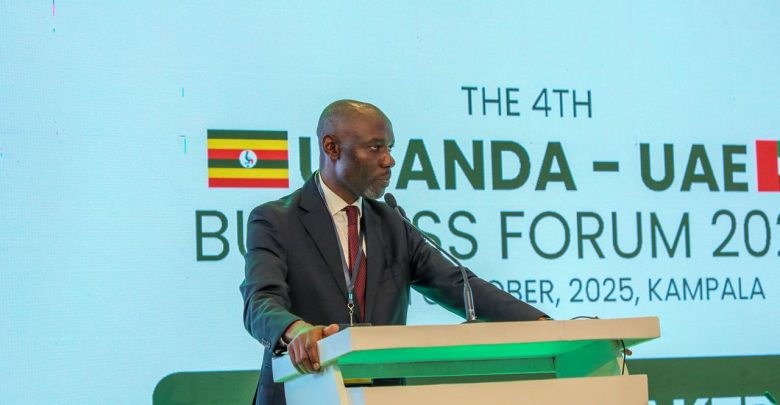Uganda Launches Business Center in UAE to Boost Exports and SME Growth

Uganda has launched a new Uganda Business Center in the United Arab Emirates to help exporters and small and medium-sized enterprises (SMEs) expand into Gulf markets, in what officials describe as a key step toward scaling the country’s export capacity and attracting new investment.
The announcement was made by Ambassador Kibedi Zaake, Uganda’s envoy to the UAE, during the opening of the Fourth Uganda–UAE Business Forum held this Tuesday at Speke Resort Munyonyo in Kampala.
The forum brought together over 300 business leaders, investors, and policymakers from both countries to explore partnerships in trade, energy, tourism, and innovation.
“We’ve set up a Business Center to support exporters and SMEs—helping them expand markets, improve products, gain market intelligence, and access tailored assistance,” Kibedi said.
“If we work closely with it, Uganda’s export numbers will dramatically increase.”
The Uganda Business Center, established jointly by the Uganda Embassy in Abu Dhabi and the Consulate General in Dubai, will act as a one-stop hub for market access, product certification guidance, export readiness training, and business networking.
It is designed to bridge information gaps that often hinder Ugandan exporters from taking full advantage of the UAE’s expanding market for African goods.
According to Ambassador Kibedi, the center will provide Ugandan businesses—especially in agriculture, manufacturing, and services—with access to market data, distribution contacts, and quality compliance insights.
“Our traders have often struggled with consistency, quality, and quantity in exports. This center will directly address those gaps,” he said.
Trade Growth and Economic Impact
Trade between Uganda and the UAE has surged from $600 million in 2018 to $2.85 billion in 2024, making the UAE Uganda’s top export destination.
Key exports include coffee, gold, fish, and fresh produce. Kibedi said that with better coordination through the new center, trade volumes could “easily grow tenfold.”
The UAE has also become a major source of foreign direct investment (FDI) in Uganda, rising from $100 million in 2018 to $3.5 billion in 2024, with projects spanning renewable energy, real estate, logistics, and agro-industry.
Prominent investors include AMEA Power, Alpha MBM Investments, DP World, and Masdar, which are all deepening their presence in Uganda.
Kibedi said the initiatives of the Embassy complement the government’s wider goal under the Tenfold Growth Strategy, which aims to transform Uganda’s economy into a $500 billion powerhouse by 2040 through export diversification and industrialization.
“The UAE’s journey from a $686 million economy in 1970 to over $530 billion today shows what strategic partnerships can achieve,” Kibedi said. “We can follow that path through innovation and disciplined collaboration.”
Economic ties between the two nations have been bolstered by six daily flights connecting Entebbe and Dubai—up from just two in 2018—operated by Emirates, FlyDubai, Air Arabia, and Uganda Airlines.
Meanwhile, the number of Ugandans living in the UAE has quadrupled to over 160,000, driving remittance inflows from $50 million to $350 million annually.